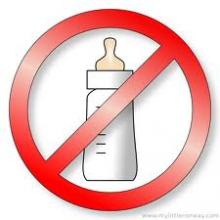
The ingredient called pancreatic secretory trypsin inhibitor, or PSTI, is found at its highest levels in colostrum - the milk produced in the first few days after birth. The lining of a newborn's gut is particularly vulnerable to damage as it has never been exposed to food or drink. The new study highlights the importance of breastfeeding in the first few days after the birth.
The researchers found small amounts of PSTI in all the samples of breast milk they tested but it was seven times more concentrated in colostrum samples. The ingredient was not found in formula milk.
The researchers examined the effects of this ingredient on human intestinal cells in the lab. When they inflicted damage to the cells they found that PSTI stimulated the cells to move across the damaged area forming a natural protective 'plaster'. They also found that PSTI could prevent further damage by stopping the cells of the intestine from self-destructing.
PSTI is a molecule which is normally found in the pancreas where it protects the organ from being damaged by the digestive enzymes it produces. Research suggests that it plays a similar protective role in the gut.
Breastfeeding Makes Children Smarter
A 2008 study from Canada found that breastfeeding babies seems to make them smarter. In fact, children fed breast milk exclusively for the first three months of life were found to score higher on IQ tests at the age of six than bottle fed children.
Breastfed Babies 'More Intelligent', Study
Breastfeeding your baby raises their IQ levels, according to research. The most comprehensive British study of breastfeeding to date shows that breastfeeding continues to have an effect on a child's mental ability right through their early teens. The study of more than 10,000 children found that those breastfed exclusively for at least the first four weeks of life consistently outperformed those put on the bottle from birth. Researchers from Essex made their conclusions after "pairing up" children who in all major respects, such as family circumstances and maternal IQ, were identical.
The only difference was whether or not they were breastfed. They then compared each of these "twin" pairs to gauge the difference made by breastfeeding. Numerous studies have shown that breastfeeding improves a young child's health. A 2008 study also found that children fed breast milk exclusively for the first three months of life scored higher on IQ tests at the age of six than bottle fed children. Other evidence suggests that breastfed infants tend to get fewer infections and fewer allergies.
Breastfeeding Prevents Allergies
In other research, Spanish scientists studied 1460 children between the ages of three and seven to find a relationship between breastfeeding and allergies, including skin and sinus allergies. The researchers found that those who were breastfed for three months had fewer allergies and concluded that "the recommendation to exclusively breastfeed for as long as possible continues to be valid, as there was a significant preventive impact on the development of allergic diseases with the length of time breastfed."
Fewer Infections
Giving babies nothing but breast milk for the first six months reduces the number and severity of infections they suffer, research has confirmed.
Research on nearly 1,000 babies found those exclusively breastfed for six months had significantly fewer common infections than babies who were either partially breastfed or not breastfed at all. Infection rates - including respiratory and urinary infections, ear infections (otitis media), stomach upsets (gastroenteritis), conjunctivitis and thrush - were tracked at the one-, three-, six-, nine- and 12-month marks.
Partial breastfeeding did not have the same protective effects as prolonged exclusive breast-feeding, the study found. And when infection did strike, the illness was typically less severe among children who were exclusively breast-fed (having ingested no substitute formula) in their first six months of life, the study authors stated.
The researchers observed that the longer an infant was breast-fed exclusively, the lower the child's risk for infection. Longer exclusive breast-feeding also appeared to translate into fewer visits to a doctor and fewer infection-related hospital admissions.
Benefits to the Mother
It's convenient and cheaper for your budget.
It helps you to loose excess weight.
Suckling produces Oxytocin, which causes the womb to contract to its pre-birth size.
The risk of producing breast cancer is reduced, which is further reduced for every child that is breast feed and the longer the period of breastfeeding.
Benefits to the Child
Breast fed babies are at an advantage, since suckling strengthens their jaws and aids in their transition from milk to solids. It also aids in their speaking.
Breast milk is healthier! Colostrum (the first type of milk produced by the breast) is packed with rich nutrients, protein and antibodies acting as a boost for the child's underdeveloped immune system. antibodies which formula milk is void of, offer protection from infections.
Breast milk is higher in vitamin D and E and research has shown that breast milk is two and a half times more effective in preventing rickets.
Breast milk contains more minerals; some of these are not found in formula milk, such as selenium and chromium. Selenium is an essential immune booster, whilst chromium helps maintain a balance in the blood sugar levels. Minerals such as calcium, iron, zinc and Manganese from breast milk are more absorbable than those in formula milk.
Unlike formula milk, breast milk helps to establish healthy gut bacteria such as Bifido. These bacteria safeguard the baby's digestive tract from harmful invading bacteria and inhibit the development of colic and eczema. obesity is less common in breast-fed babies compared to their formula fed counterparts.
Breast milk makes brainier babies! Higher levels of the fat DHA, essential in developing the brain, are found in breast milk. Research has shown breast fed babies score 6-10 points higher in IQ tests than their formula fed counterparts.
